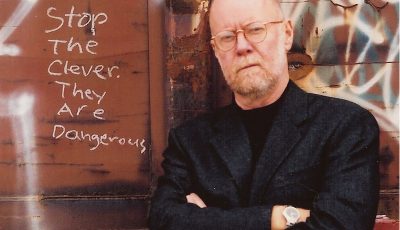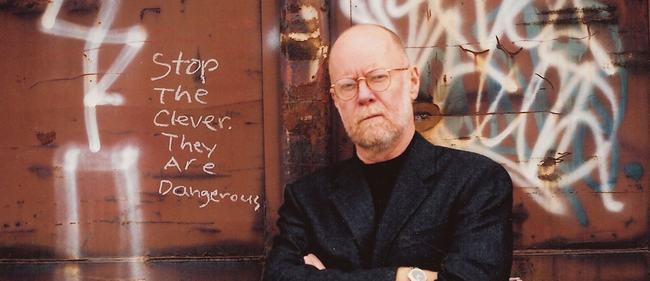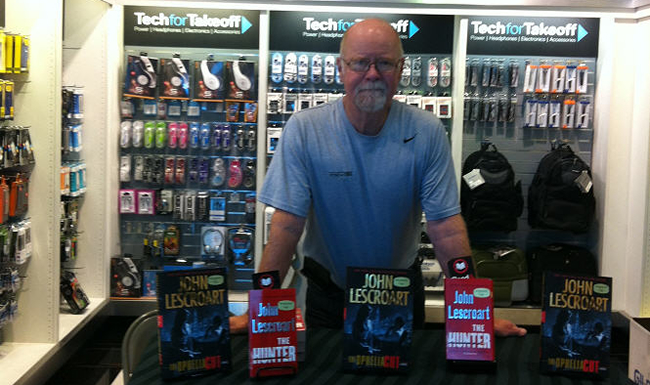

Up Close: John Lescroart
Playing Fast and Loose with the Law
 By J. H. Bográn
By J. H. Bográn
In John Lescroart’s new thriller, THE RULE OF LAW, Dismas Hardy knows something is amiss with his trusted secretary, Phyllis. Her out-of-character behavior and sudden disappearances concern him, especially when he learns that her convict brother—a man who had served 25 years in prison for armed robbery and attempted murder—has just been released.
Things take a shocking turn when Phyllis is suddenly arrested at work for allegedly being an accessory to the murder of Hector Valdez, a coyote who’d been smuggling women into the country from El Salvador and Mexico. That is, until recently, when he was shot to death—on the same day that Phyllis first disappeared from work.
The connection between Phyllis, her brother, and Hector’s murder is not something Hardy can easily understand, but if his cherished colleague has any chance of going free, he needs to put all the pieces together—and fast.
The idea for this novel dates back to December of 2016, when Lescroart began to ponder what his next project should be.
One month prior, Donald Trump had won the U. S. presidential election. “A man who even under the kindest light seemed to play fast and loose with the concept of rule of law,” Lescroart says. “So I didn’t have to cast very far to hook into a theme that could propel a timely, high-concept thriller.”
He combined that idea with elements of his 2017 book, Fatal—the ambiguous ending and the fact that the villain never received proper comeuppance for being a murderer. This sparked a myriad of questions and “what if’s” for Lescroart.
“What if, I thought, I could bring that man back and put him in a position of power? How would he deal with it? Who else would be affected by his arrogance and disregard for playing according to the rule of law?” he says. “How about if my own hero, Dismas Hardy, gets caught in the crosshairs? Here, I thought, I had all the elements.”
One might even claim that THE RULE OF LAW essentially wrote itself.
Immigration and sanctuary cities play an important role as the author wanted to draw parallels between these issues and what was, and is, going on in the real world. “My villain’s cynical manipulation of the political climate helped, I hope, to create a powerful, resonant, and above all, believable scenario that showcased the truly evil nature of the man.”
When Lescroart was a child of about six years, his sister used to torment him by growling the name Phyllis McGowan at him. In hindsight, he’s unsure why exactly that name terrorized him. But the subconscious has funny ways to seep bits into reality. Phyllis became the name of Dismas Hardy’s secretary—but her surname never showed up on the page.
“Little did I know until she showed up in THE RULE OF LAW that she was in fact the same Phyllis McGowan who had so terrified me as a young boy,” he says. “Once I understood that, I realized that there was no end to the depth of this woman’s character, and to make her a central player in San Francisco’s immigration struggles was just completely unexpected and cool. To give her the role of cultural hero of sorts, hidden in plain sight, just struck me as one of the great inspiration moments that make a book come alive. And the more she appeared, the more we come to know about her, and all the surprises in her nature—her stubbornness, her sense of humor, her bravery.”
Several of Lescroart’s characters have a series of their own. After twenty books, he knows what makes them tick, so choosing which plot belongs with each series is an organic process.
“If there is a heavy police procedural element in my plot, generally speaking, Abe Glitsky decides to show up and carry the heavy load,” he explains. “Whereas if there is a huge legal issue that is driving the plot, Dismas Hardy is my man. Wyatt Hunt comes in if the plot involves a heavy mystery element.”
As for his writing habits, Lescroart’s are as regular as can be. He dedicates the morning to answering emails, paying bills, and every other item that may distract him from the actual writing. He calls this process the “sorting my sock drawer” preparation.
Once he sits at the desk to work, he follows Hemingway’s suggestion and tries to write one true thing. Usually this thing becomes a scene that he feels is, above all, entertaining. He quits at five o’clock sharp, and avoids working on weekends.
“These days I’m finding myself thinking less in terms of book ideas and more in terms of projects that I’m working on right now, the most important ones trying to be the best husband I can be to my wife, Lisa, the best father I can be to my two children, Justine and Jack, and the best grandfather I can be to my wonderful granddaughter, Cora Violet,” he says.
“As to the next book and what it’s about, I think I’ll just let the suspense build a little longer.”
- Clive Cussler’s Desolation Code by Graham Brown - December 13, 2024
- Mark Greaney by José H. Bográn (VIDEO) - June 27, 2024
- Brian Andrews & Jeffrey Wilson by José H. Bográn (Video) - May 23, 2024



